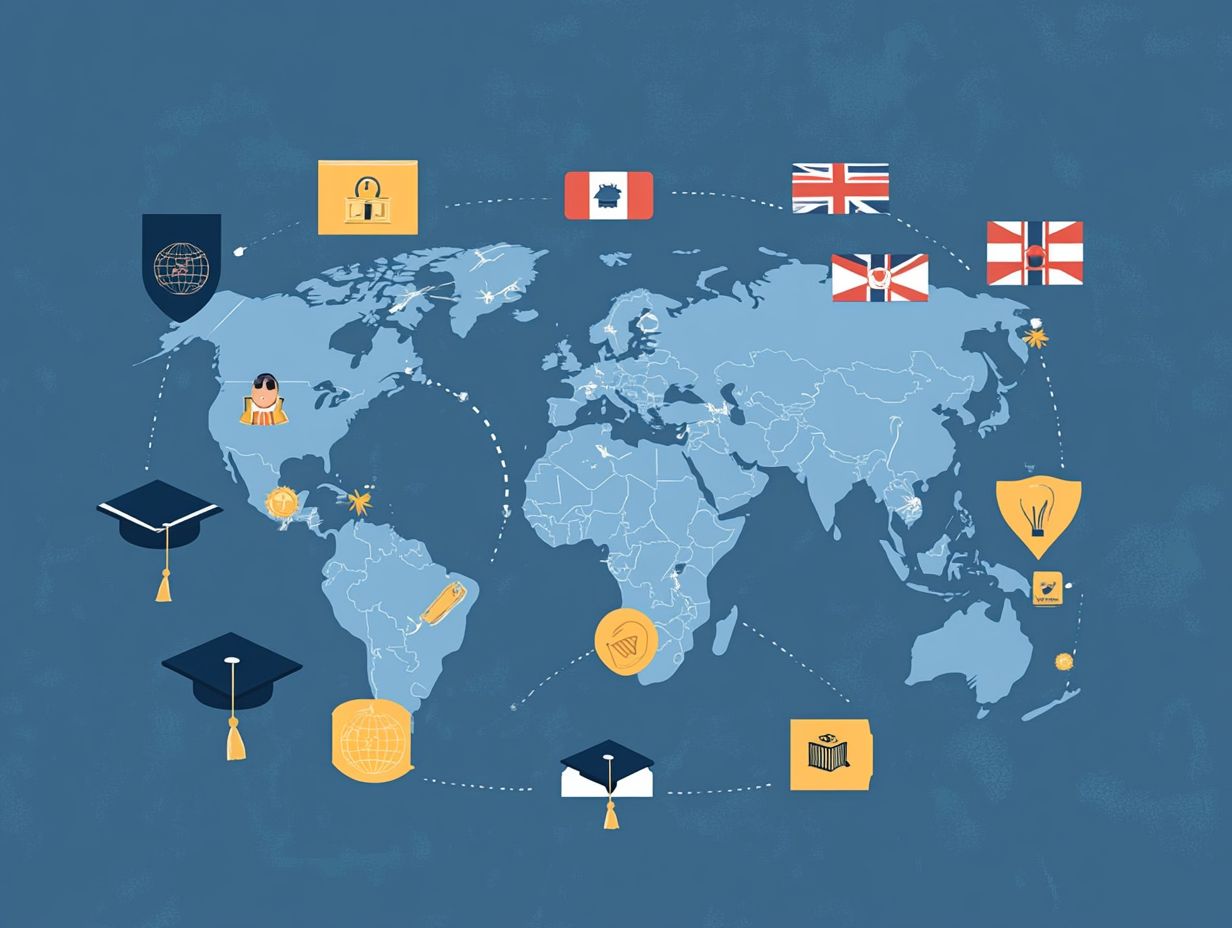Regional Differences in Project Management Certification
In today s globalized world, obtaining project management certification is an essential asset for professionals like you who aspire to hone their skills and propel their careers forward.
Get ready! This article explores the exciting world of project management certification. Navigating the sea of certifications can be quite daunting, especially with the plethora of options available across different regions. We will spotlight key certifying bodies like the Project Management Institute (PMI), PRINCE2, and Agile, and examine how regional variations influence their requirements and recognition.
We will also discuss the benefits and challenges you might encounter while pursuing certification in various locations. This guide will furnish you with essential insights to help you select the best path for your career.
Contents
- Key Takeaways:
- Overview of Project Management Certification
- Major Certifying Bodies
- Regional Differences in Certification
- Benefits of Certification in Various Regions
- Challenges in Obtaining Certification in Different Regions
- Tips for Choosing the Right Certification for Your Region
- Frequently Asked Questions
- What are some common regional differences in project management certification?
- Are there specific certifications that are more regionally recognized than others?
- Do regional differences in certification affect career opportunities?
- How can I prepare for regional differences in certification?
- Can I use my certification in different regions?
- Are there resources to understand regional differences in project management certification?
Key Takeaways:

Project management certifications are valuable worldwide. However, their requirements and recognition can vary by region. Having these certifications can significantly boost your career and job prospects. Choose a certification that fits your regional context for the best results.
Overview of Project Management Certification
Project Management Certification provides a clear path to enhance your skills in various project settings, especially in IT. These credentials verify your project management skills and expand your understanding of key methodologies.
By obtaining credentials from esteemed organizations like the Project Management Institute or the Agile Certified Practitioner, you can gain recognition and propel your career forward. PRINCE2 certification offers a robust framework that sharpens project oversight and enhances stakeholder engagement.
The importance of these certifications is further underscored by their role in helping teams get better over time and boosting performance.
Definition and Purpose
Project management is about using your knowledge, skills, tools, and techniques to complete projects successfully. It focuses on meeting deadlines, sticking to budgets, and maintaining quality standards.
Effective methodologies ranging from Agile to Waterfall provide guidance for project execution while allowing for adjustments in response to evolving needs.
A crucial figure in this process is the project manager, who coordinates resources, mitigates risks, and ensures all stakeholders remain aligned with the project’s vision.
They must adeptly navigate project constraints, balancing the iron triangle of scope, time, and cost, while facilitating comprehensive planning activities that lay the foundation for successful outcomes.
Major Certifying Bodies
Many organizations offer project management certifications. The Project Management Institute, known for its Project Management Professional (PMP) and Certified Associate in Project Management (CAPM), is highly regarded.
These certifications are essential for validating your skills as a project manager and ensuring you possess a comprehensive understanding of project management frameworks and methodologies.
Other valuable certifications include PRINCE2, which teaches structured project management, and the Agile Certified Practitioner, focusing on agile teamwork.
This diversity in certifications is designed to meet the evolving needs of project environments across various industries, providing you with the tools to excel in your career.
Comparison of PMI, PRINCE2, and Agile Certifications
When comparing certifications from PMI, PRINCE2, and Agile methodologies, it s crucial to understand their unique frameworks and approaches to project management. Each certification offers distinct methodologies tailored to different project environments and objectives.
PMI emphasizes clear guidelines and best practices. This approach focuses on defining and controlling the entire project life cycle, including risk management and documentation processes.
PRINCE2 offers a structured framework that outlines principles, themes, and processes. You can tailor this framework for specific projects while ensuring thorough documentation and evaluation at every stage.
Agile methodologies advocate for flexibility and iterative processes, allowing teams to adapt swiftly to changes. This makes Agile particularly advantageous in dynamic environments where effective risk management and continuous stakeholder engagement are essential.
By understanding these differences, you can greatly enhance your ability to select the right approach based on your project needs.
Regional Differences in Certification

Regional variations in project management certification can significantly impact the requirements and recognition associated with these project management certifications across different countries.
These differences highlight the unique approaches to project management shaped by the cultures and practices prevalent in each region.
Requirements and Recognition in Different Countries
In various countries, the landscape of project management certifications is remarkably diverse. This diversity impacts educational pathways and career prospects significantly.
Take the United States, for instance. Here, certifications like the Project Management Professional (PMP) are highly regarded and often serve as prerequisites for career advancement. This can motivate you to seek formal education and training to enhance your credentials.
In contrast, regions like Eastern Europe may prioritize local certifications that cater to specific industry needs. This results in a more customized approach to project management training, especially with the rise of remote project management certifications.
The Asia-Pacific region is rapidly evolving, with the certification arena closely mirroring new business practices and reflecting a growing alignment with global standards.
What a difference in requirements! This not only influences the educational trajectory of aspiring project managers but also shapes their employment opportunities and effectiveness in managing projects tailored to their unique markets.
Benefits of Certification in Various Regions
Don t miss out! Obtaining project management certification can unlock incredible opportunities that elevate your career across multiple regions.
It significantly enhances your career opportunities and increases business value by driving improved project success rates.
Impact on Career and Job Opportunities
The impact of project management certification on your career and job opportunities is truly significant.
As a certified project manager, you re likely to enjoy greater recognition, higher salaries, and a broader range of job prospects in today s competitive market.
Data from the Project Management Institute underscores this trend, showing that certified professionals can earn up to 20% more than their non-certified peers.
Industry professionals frequently share their success stories, detailing how certification has strengthened their leadership abilities and enriched their project experience. This often leads to substantial promotions and key roles within their organizations.
One certified manager remarked, “Achieving my certification not only refined my skill set but also prepared me for leadership positions I never thought were within my reach.”
This clearly illustrates the transformative power of obtaining certification in the dynamic field of project management.
Challenges in Obtaining Certification in Different Regions
Despite the advantages, pursuing project management certification can present a range of challenges. In many areas, language barriers and cultural differences create obstacles to accessing certification resources.
Language Barriers and Cultural Differences

Language barriers and cultural differences can create obstacles for project management professionals seeking certification. These issues can affect your understanding of the requirements and exam content.
If English proficiency is limited, interpreting the nuances of certification materials can be challenging. This can complicate your preparation and shake your confidence as you approach the exams.
Cultural differences in learning styles may also impact your engagement with project management education. This often leads to a disconnect between your experiences and the standards outlined for certification.
To overcome these challenges, organizations can offer language resources and tailored training programs. This ensures educational materials are accessible and relevant to your needs.
Community-based discussion forums can foster knowledge sharing. This enables you and your peers to collaborate and gain a deeper understanding of the certification process, enhancing your chances of success.
Tips for Choosing the Right Certification for Your Region
Choosing the ideal project management certification requires a thoughtful approach. Consider several key factors to guide your decision.
Assess the local demand for specific certifications and evaluate the resources available for effective preparation.
Considerations and Resources
When evaluating certification options, consider how each aligns with your career goals. Be aware of the resources available for your preparation and study.
Understanding a certification’s recognition in the industry can significantly influence its value. Take note of how respected it is among employers and peers to enhance your professional credibility.
Explore various study materials, from online courses to textbooks, for effective learning. Look for strong support networks, such as forums or mentorship programs, that can provide guidance throughout your certification journey.
Frequently Asked Questions
What are some common regional differences in project management certification?
Common differences include variations in certification requirements, exam formats, and recognition by employers.
Are there specific certifications that are more regionally recognized than others?

Yes, some certifications hold more recognition in certain regions. For example, the Project Management Professional (PMP) is highly recognized in North America, while PRINCE2 is more popular in Europe.
Do regional differences in certification affect career opportunities?
Yes, regional differences can impact career opportunities. Employers in specific regions may prefer or require particular certifications, making them valuable assets for job seekers.
How can I prepare for regional differences in certification?
It’s important to research the specific requirements of the region you want to work in. You may need multiple certifications or focus on one that is highly recognized there.
Can I use my certification in different regions?
Most project management certifications are recognized globally. However, check with local employers or organizations to ensure your certification is accepted.
Are there resources to understand regional differences in project management certification?
Absolutely! Many resources are available for you.
Explore online forums, connect with business groups, and talk to career advisors to learn about the role of certification in project management career and the differences in project management certification across regions.






